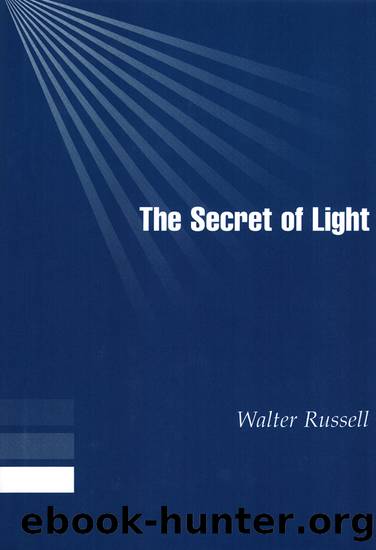The Secret of Light by Walter Russell

Author:Walter Russell [Russell, Walter]
Language: eng
Format: azw3
Publisher: University of Science and Philosophy
Published: 2023-10-12T00:00:00+00:00
Chapter XIV
WEIGHT
â Weight is a measure of unbalance. It indicates the intensity of desire of any mass which is out of balance to find balance.
â Every mass in the universe has its proper potential position. Every mass will find that position if not prevented from doing so by the bindings of other masses.
â Weight should be measured dually as temperature is. It should have an above and a below zero to measure the intensity of desire in masses to rise from the earth as well as to fall toward it.
â WEIGHT IS MATTER OUT OF PLACE
â All matter is a record of its potential at the place of its birth in its wave. Masses of matter, like buoys floating in the ocean to mark courses for ships, are floating in space to register the electric potential of the position of their birth.
â Whenever matter is in the place of its birth, it belongs there. It is, therefore, in balance. It floats in its balanced field. In that position it is weightless in respect to any thing else in the universe. Whenever it is taken from its field center, or becomes an eccentric part of another field, it is out of balance with the two forces acting upon it. It then has weight, and the measure of that weight is the measure of its unbalance with its out-of-place environment.
â Weight of matter and measure of electric potential are one and the same thing.
â WEIGHT IS UNBALANCE
â A body which floats has no measurable weight. It is in balance with its environment. Likewise, a dead battery has no measurable electric potential. The ammeter needle points to zero. Its two unbalanced conditions of charge and discharge have become voided by each other.
â The measure called âweightâ and the measure called âelectric potentialâ are the expression of force which the two electric opposites of charge and discharge exert against each other at any point in the universe.
â The potential of all orbits of matter in space in which matter floats is equal to the potential of the mass which floats in it.
â The plane of our earthâs equatorial region coincides with an equipotential plane of pressure which is equally balanced in respect to that part of the earth which floats above that plane, and that part which floats below it. In this plane the earth has no weight whatsoever in respect to anything in the entire universe, for it is in a balanced position in respect to the entire universe and keeps moving into a new position only because of the movement of all other masses in the universe.
â OUR BALANCED EARTH IS WEIGHTLESS
â The earth could have weight only if removed to other pressures farther extended from the plane of the lenslike wheel of which our sun is the hub. If it could be pushed toward the sun by some giant hand, it would seek balance in its own orbit when released, exactly as a man would rise when plunged beneath his own balance level in water.
Download
This site does not store any files on its server. We only index and link to content provided by other sites. Please contact the content providers to delete copyright contents if any and email us, we'll remove relevant links or contents immediately.
The Complete Stick Figure Physics Tutorials by Allen Sarah(7373)
Secrets of Antigravity Propulsion: Tesla, UFOs, and Classified Aerospace Technology by Ph.D. Paul A. Laviolette(5371)
Thing Explainer by Randall Munroe(3939)
The River of Consciousness by Oliver Sacks(3604)
The Order of Time by Carlo Rovelli(3193)
How To by Randall Munroe(3115)
A Brief History of Time by Stephen Hawking(3024)
I Live in the Future & Here's How It Works by Nick Bilton(2997)
What If?: Serious Scientific Answers to Absurd Hypothetical Questions by Randall Munroe(2705)
The Great Unknown by Marcus du Sautoy(2694)
Midnight in Chernobyl by Adam Higginbotham(2549)
Blockchain: Ultimate Step By Step Guide To Understanding Blockchain Technology, Bitcoin Creation, and the future of Money (Novice to Expert) by Keizer Söze(2496)
Networks: An Introduction by Newman Mark(2406)
The Meaning of it All by Richard Feynman(2355)
Easy Electronics by Charles Platt(2333)
The Tao of Physics by Fritjof Capra(2276)
Midnight in Chernobyl: The Untold Story of the World's Greatest Nuclear Disaster by Adam Higginbotham(2234)
Introducing Relativity by Bruce Bassett(2124)
When by Daniel H Pink(2118)
